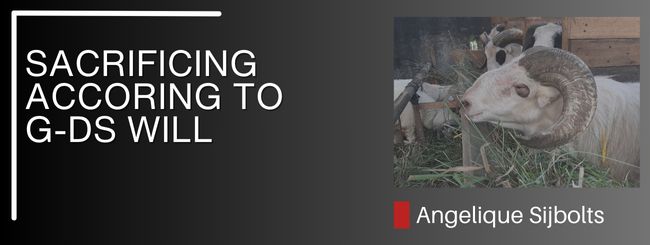בס”ד
PARSHAT SHEMINI 5784
An Examination of Obedience
In this text we witness that the offering was not consumed by the priests with fire, but rather the Eternal did so Himself. This signified the acceptance of the people’s offerings as a demonstration of seeking reconciliation for their transgressions regarding the golden calf, and it showed that the Eternal had forgiven the people.
Moving to Leviticus 10:1-3
| ow Aaron’s sons Nadab and Abihu each took his fire pan, put fire in it, and laid incense on it; and they offered before Hashem alien fire, which had not been enjoined upon them. | וַיִּקְח֣וּ בְנֵי־אַֽ֠הֲרֹ֠ן נָדָ֨ב וַֽאֲבִיה֜וּא אִ֣ישׁ מַחְתָּת֗וֹ וַיִּתְּנ֤וּ בָהֵן֙ אֵ֔שׁ וַיָּשִׂ֥ימוּ עָלֶ֖יהָ קְטֹ֑רֶת וַיַּקְרִ֜יבוּ לִפְנֵ֤י יְ”הֹוָה֙ אֵ֣שׁ זָרָ֔ה אֲשֶׁ֧ר לֹ֦א צִוָּ֖ה אֹתָֽם | |
| And fire came forth from Hashem and consumed them; thus they died at the instance of Hashem | וַתֵּ֥צֵא אֵ֛שׁ מִלִּפְנֵ֥י יְ”הֹוָ֖ה וַתֹּ֣אכַל אוֹתָ֑ם וַיָּמֻ֖תוּ לִפְנֵ֥י יְ”הֹוָֽה | |
| Then Moses said to Aaron, “This is what Hashem meant by saying: Through those near to Me I show Myself holy, And gain glory before all the people.” And Aaron was silent. | וַיֹּ֨אמֶר משֶׁ֜ה אֶל־אַֽהֲרֹ֗ן ה֩וּא אֲשֶׁר־דִּבֶּ֨ר יְ”הֹוָ֤ה | לֵאמֹר֙ בִּקְרֹבַ֣י אֶקָּדֵ֔שׁ וְעַל־פְּנֵ֥י כָל־הָעָ֖ם אֶכָּבֵ֑ד וַיִּדֹּ֖ם אַֽהֲרֹֽן |
We see that Nadab and Abihu bring incense before the Eternal, and in contrast to the previous event, they are consumed by fire. It is commonly assumed that Nadab and Abihu were punished for offering unauthorized fire, something that the Eternal had not commanded. Essentially, they did something the Eternal had not requested. But what exactly constituted their transgression that led to such severe consequences? Perhaps they were so deeply moved by the event of burning the offering that they sought to extol the Eternal further with their incense. Given that there was no prohibition at the time against entering the sanctuary without permission, they could not have been sentenced to death for that. Perhaps their action was well-intended, as they were eager to express gratitude or honor to the Eternal, still deeply immersed in the experience of the offering’s fire.
Regarding what they did wrong, let’s refer to Exodus 30:7-8:
Here, the command is specific to Aaron, tied to a particular time, and involves a warning against offering “strange incense.” This term refers to incense brought with incorrect spices, at the wrong time, and by the wrong person. In Nadab and Abihu’s case, at least two aspects went astray: they were not Aaron, and they brought the incense at the wrong time. Had the timing been correct, Aaron would have been present in the sanctuary, yet there is no mention of him being there. Whether the incense itself was also incorrect remains unclear from the text. Nonetheless, as sons of Aaron, they would have had access to the appropriate incense.
Hence, the crux of the matter lies in adhering to the right timing and the right person. Within Judaism, we recognize holy times, holy people, and holy spaces, each with specific roles and functions. The Eternal granted humanity free will, creativity, and initiative, but just as a parent must sometimes step back to allow a child to learn and grow independently, the Eternal also maintains a certain distance. When serving the Eternal in the sanctuary, His will should always take precedence. Just as children obey their parents’ rules when visiting them out of respect, individuals should adhere to the Eternal’s will when entering His sanctuary.
The error of Nadab and Abihu lay in prioritizing their own will above that of the Eternal. While their consumption by fire may appear as punishment, it can also be viewed as a consequence of their misguided choice. When individuals conflate the Eternal’s will with their own, the sacred becomes profane, leading to spiritual death.
Entering the sanctuary in accordance with the Eternal’s will brings reconciliation and life, whereas entering with one’s own will incurs the Eternal’s displeasure. Therefore, it is imperative for individuals, including the sons of Noah, to discern whether their actions align with the Eternal’s will or their own desires.
Noah’s sons must keep their seven mitzvot and their further elaboration. Good deeds like charity, honouring parents, which are mitzvot in Judaism, one can apply in one’s own life. However, certain mitzvot are explicitly designated for the Jewish people, such as laying Tefillin, as stated in the Tanakh. In Deuteronomy 28:10, we find:
The question that should therefore be central is: is it the will of the Eternal, or is it something I desire?
You can easily make the distinction by asking yourself whether it is a general mitzvah between you and another person, and between you and the Eternal, or whether it is a specific mitzvah intended to set the people apart from other nations, to sanctify the people for their role as a Priestly nation.
Learning Points
1. It is essential to distinguish the will of the Eternal from our own will.
2. Within the service of the Eternal, His will should be paramount, not our own desires.
3. Confusing our will with the will of the Eternal can lead to serious consequences, as seen with Nadab and Abihu.
4. Study of the Torah and understanding the proper application of the commandments help in discerning the will of the Eternal.
5. Observance of the mitzvot should occur in accordance with the instructions given by the Eternal, not according to our own interpretations or desires.
By Angelique Sijbolts
Sources
Rabbeinu Baya on Leviticus 9:24:1-2:
Tur HaAroch, Leviticus 9:24
“Fire – Holy and Unholy”
There are various commentaries suggesting that Nadab and Abihu did not have good intentions. They believed that Moses and Aaron had had their best time and that they, the next young generation, would take over properly.
© Copyright, all rights reserved. If you enjoyed this article, we encourage you to distribute it further.
Our blogs may contain texts/ quotes/references/links of
Mechon-Mamre.org, Aish.com, Sefaria.org, Chabad.org AskNoah.org
that contain copyrights and which we may use with there permission.
